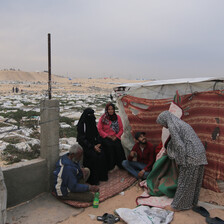The Electronic Intifada 3 December 2023

With a lack of water and hygiene products, while bearing the bulk of childcaring responsibilities, women are among the hardest hit in Israel’s attack.
APA imagesWith no electricity since 11 October, no running water and aid supplies at a premium, it is Gaza’s most vulnerable that are paying the highest price for Israel’s genocidal violence.
Children have been killed in appalling numbers, civilian infrastructure has been decimated and some 80 percent of Gaza’s population are homeless, forced to shelter in overcrowded schools, UN facilities and private homes.
Women and girls are especially hard hit. Bereft of privacy, whether seeking refuge outside their homes or within the confines of home, the lack of running water in Gaza leaves women and girls grappling with a lack of essential hygiene tools, hindering their ability to maintain personal hygiene during menstruation.
Confronted with inadequate access to sanitary pads and tampons, women are resorting to norethisterone tablets designed to postpone periods, despite the potential adverse effects associated with these medications.
Walid Abu Hatab, a medical consultant specializing in obstetrics and gynecology, said such tablets work by maintaining elevated progesterone hormone levels, preventing the shedding of the uterine lining and thereby delaying menstruation.
Nisreen, 38, had to seek refuge at a relative’s house in Maghazi refugee camp, central Gaza, where water shortages necessitate rationing of baths and showers. Faced with dwindling supplies and a lack of sanitary pads, Nisreen reluctantly turned to menstruation-delaying pills.
Demand for sanitary pads outstrips available supply, driving women like Nisreen to opt for alternative solutions like period-delaying tablets.
Frequent use of these pills, however, can have adverse effects, from irregular vaginal bleeding, nausea, menstrual cycle changes, dizziness, and mood swings, posing additional health risks for those already enduring the ceaseless bombardment.
War’s toll on women
Nevin Adnan, a psychologist and social worker, emphasized the multiple challenges women face during menstruation in times of extreme stress and displacement. The physical and psychological symptoms associated with menstruation intensify, including abdominal and back pain, insomnia, nervousness and tension, she said.
The scarcity of clean water and feminine hygiene products has reached alarming levels, she added. Limited access to bathrooms and laundry services profoundly affect women’s mental and social well-being, exacerbated by overcrowded shelters and restricted privacy.
Shelters lack privacy, running water and essential supplies, leaving women to grapple with menstrual cramps amid constant fear, sleep deprivation, and harsh living conditions.
For girls experiencing their first menstruation in these circumstances, furthermore, the use of period-delaying pills poses significant health risks.
The impact of the conflict disproportionately affects women and girls, who endure physical and psychological challenges exacerbated by the scarcity of basic necessities. The road to recovery for these women is daunting, with survival measured in years.
Access to clean water is a critical challenge. Neglecting menstrual hygiene in this context poses serious health risks, emphasizing the need for prioritization.
Menstruation, a challenging time for many women, becomes even more difficult in these circumstances. The lack of understanding about menstrual health among men and boys adds to the challenges faced by women and girls living in shelters.
In Maghazi refugee camp, Nisreen said the psychological and physical toll of war is especially hard on women, who not only contend with menstrual health concerns but also shoulder the responsibility of caring for their children amid the chaos.
Her use of menstrual delaying pills is simply a way to cope in the short term, she said. Despite the risks.
Eman Alhaj Ali is a journalist and translator based in Gaza.





